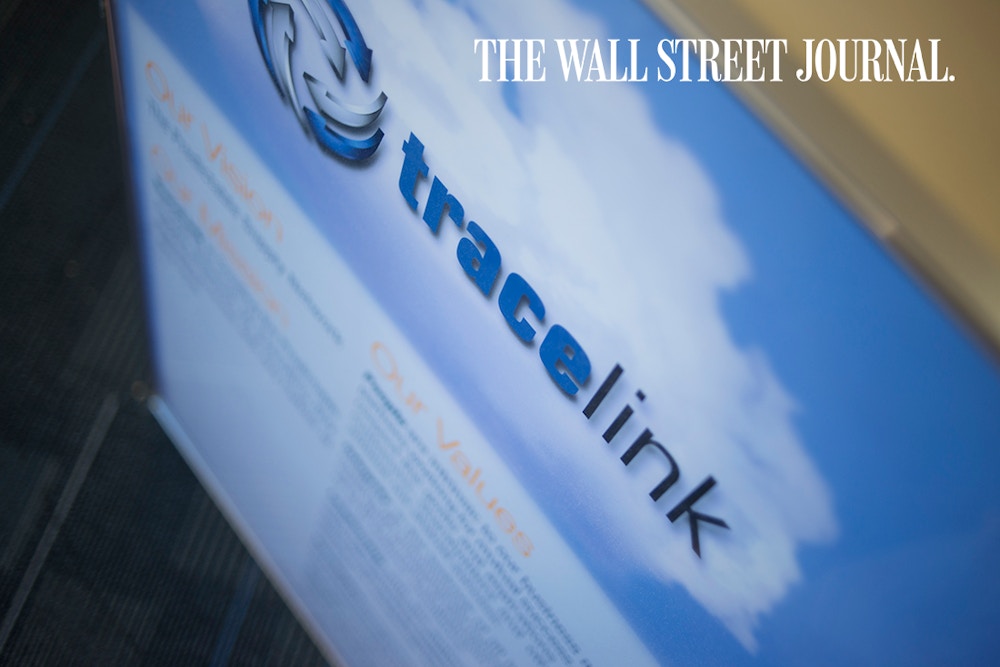“To sharpen its predictions, the company’s health-care division plans to start testing a cloud-based software platform later this year. The platform, made by North Reading, Mass.-based TraceLink Inc., can analyze in real time data points from various organizations within Merck’s supply chain, including pharmacies, hospitals and wholesale distributors.”
By Sara Castellanos
Merck KGaA plans to use analytics and machine learning to predict and prevent drug shortages, a move that could also save it money.
Currently, the Germany-based pharmaceuticals company needs to stockpile medications to make sure it has enough on hand, meaning some of them expire before they can be used. Merck said its supply-and-demand forecasts are about 85% accurate today.
To sharpen its predictions, the company’s health-care division plans to start testing a cloud-based software platform later this year. The platform, made by North Reading, Mass.-based TraceLink Inc., can analyze in real time data points from various organizations within Merck’s supply chain, including pharmacies, hospitals and wholesale distributors.
TraceLink is now developing machine-learning algorithms that will be used in the pilot, which will begin with immuno-oncology drugs, designed to boost the body’s immune system to fight cancer. “We want to start it in an area where the product is a lifesaving product,” said Alessandro DeLuca, chief information officer for Merck’s health-care division.
“The value is going to be that every single patient will receive the drug that he or she needs at the right moment,” Mr. DeLuca said, adding that the move could significantly cut drug shortages.
The U.S. had roughly 150 to 300 drug shortages every quarter between 2014 and 2019, according to the University of Utah. Shortages can happen due to issues with manufacturing, supply-and-demand forecasts and natural disasters, according to the American Society of Health-System Pharmacists. Common classes of drugs in short supply include antibiotics, chemotherapy and cardiovascular treatments.
Analysts say more precise supply-and-demand forecasts mean pharmaceutical companies could save hundreds of millions of dollars annually, a benefit of not having excess drugs on hand and avoiding costs related to expedited shipments.
On average, pharmaceutical companies carry 156 days of inventory, according to research and advisory firm Gartner Inc. For retailers selling consumer products, it is 78 days. For IT equipment such as printers, servers and PC components, it is 57 days.
Pharmaceutical companies traditionally have predicted demand for drugs based on historical data and input from sales teams. Over the past few years, they have had access to more data about drugs in their supply chain because of a 2013 U.S. regulation that forced manufacturers to add serial numbers to medications, in part to reduce counterfeit drugs.
Drugmakers can use TraceLink’s software to generate such serial numbers, but the platform also acts as a central hub for information about the status of drugs at every phase in the supply chain. As many as 10 entities handle a drug before it gets to a patient, including manufacturers, pharmacies and wholesale distributors, said Shabbir Dahod, TraceLink’s chief executive. “It’s a highly complex supply chain,” he said.
The TraceLink network includes data from more than 275,000 organizations world-wide, including hospitals, retail pharmacies, wholesale distributors and drugmakers. Data about more than six billion serial-numbered drugs runs through the system. Besides Merck, TraceLink customers include Amerigen Pharmaceuticals Inc., Stirling Anglian Pharmaceuticals Ltd. and Morningside Pharmaceuticals Ltd.
TraceLink, founded in 2009, has raised about $167 million in venture-capital funding from investors such as Vulcan Capital, FirstMark Capital, Goldman Sachs Group Inc. and Volition Capital.
To give clients more accurate information about supply and demand, TraceLink is developing machine-learning-based algorithms to analyze the information in its network without violating data-privacy laws.
For example, algorithms could give Merck signals about the days of inventory for a specific drug and how long it will take for a drug to get to a particular phase in the supply chain, Mr. Dahod said. More of that data could also help predict the demand for a particular drug.
Over the past decade, pharmaceutical companies have been facing steep competition from rival brands, generics and biosimilars, said Stephen Meyer, a senior director and supply-chain analyst at Gartner specializing in the life-sciences industry. Investors are pressuring them to become more profitable and free up cash flow to fund product development and mergers and acquisitions, Mr. Meyer said. To that end, many are exploring ways to cut costs in their supply chains.
A better supply-and-demand forecast also makes it easier for Merck to expand into locations without a reliable supply-chain infrastructure, such as parts of Africa and Southeast Asia, said Pepe Rodriguez, managing director and partner at Boston Consulting Group who specializes in operations and supply chains in pharmaceutical companies.
“A lot of growth from pharma companies is coming from emerging markets…and some of the logistics there are challenging,” Mr. Rodriguez said.
Write to Sara Castellanos at sara.castellanos@wsj.com
